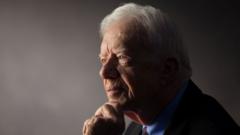In an era defined by urgent climate challenges and an increasing need for sustainable resource use, the field of optimal transport stands out as a beacon of hope. Alessio Figalli, a mathematician at ETH Zurich and a member of the Institute for Advanced Study in Princeton, dedicates his work to this crucial area, which focuses on the most efficient methods of allocating resources across different endpoints. His research has wide-ranging applications, including environmental innovations, logistics, and beyond.
Drawing from the Latin roots of the terms “optimal” and “optimize,” which connote the idea of making the best possible use of available resources, Figalli's investigations are inspired by concrete problems in nature. He believes deeply in the permanence of mathematics; once a theorem is proven, it is an unwavering truth that stands the test of time. This steadfastness is echoed in the history of optimal transport, a concept first introduced over two centuries ago by Gaspard Monge, who applied it to logistical challenges in military engineering.
Monge's groundwork laid the foundation for significant advancements in the field; further refinements came from Leonid Kantorovich, who shared the Nobel Prize in Economic Science in 1975. Kantorovich's model famously illustrates how bakeries and coffee shops can collaborate to optimize the daily delivery of goods to maximize community benefit—a concept Figalli refers to as "global wellness optimization." This principle gains even more relevance when applied to current resource management challenges, where the interplay between various stakeholders can significantly influence outcomes.
Figalli’s work emphasizes the importance of collaboration and innovation, particularly in the context of tackling global climate issues. As we strive for resilience and sustainability in our ecosystems, the principles of optimal transport can provide valuable frameworks for ensuring efficient distribution of resources. This is vital not just for economic growth, but for fostering an environment where human and natural systems can thrive together.
In working at the forefront of these mathematical applications, Figalli exemplifies the potential for abstract theories to impact real-world problems, illustrating the profound ways in which mathematics can contribute to crafting a sustainable future.
Drawing from the Latin roots of the terms “optimal” and “optimize,” which connote the idea of making the best possible use of available resources, Figalli's investigations are inspired by concrete problems in nature. He believes deeply in the permanence of mathematics; once a theorem is proven, it is an unwavering truth that stands the test of time. This steadfastness is echoed in the history of optimal transport, a concept first introduced over two centuries ago by Gaspard Monge, who applied it to logistical challenges in military engineering.
Monge's groundwork laid the foundation for significant advancements in the field; further refinements came from Leonid Kantorovich, who shared the Nobel Prize in Economic Science in 1975. Kantorovich's model famously illustrates how bakeries and coffee shops can collaborate to optimize the daily delivery of goods to maximize community benefit—a concept Figalli refers to as "global wellness optimization." This principle gains even more relevance when applied to current resource management challenges, where the interplay between various stakeholders can significantly influence outcomes.
Figalli’s work emphasizes the importance of collaboration and innovation, particularly in the context of tackling global climate issues. As we strive for resilience and sustainability in our ecosystems, the principles of optimal transport can provide valuable frameworks for ensuring efficient distribution of resources. This is vital not just for economic growth, but for fostering an environment where human and natural systems can thrive together.
In working at the forefront of these mathematical applications, Figalli exemplifies the potential for abstract theories to impact real-world problems, illustrating the profound ways in which mathematics can contribute to crafting a sustainable future.


















